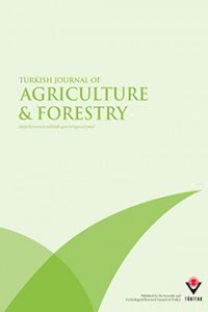Kuru Koşullarda Arıtma Çamuru Uygulamalarının Elma Araçlarının Verim, Büyüme, Beslenme Statüsü ve Ağır Metal Birikimine Etkileri
Bu araflt›rmada elma a¤açlar›nda meyve verimine, geliflimine, beslenme durumuna ve a¤›r metal birikimine ar›tma çamuru ve ah›r gübresi uygulamalar›n›n etkisi incelenmifltir. Araflt›rma tesadüf parselleri deneme desenine göre 4 tekrarlamal› olarak 2000 ve 2001 y›llar›nda Van kuru koflullar›nda yürütülmüfltür. Ar›tma çamuru 0, 10, 20, 40 ve 60 kg kg/a¤aç, ah›r gübresi 25 kg/a¤aç düzeyinde deneme topra¤›na uygulanm›flt›r. ‹ki y›ll›k araflt›rma sonuçlar›na göre, kireçli topra¤a ar›tma çamuru ilavesi meyve verimi, kümulatif verim etkinli¤i, sürgün geliflimi ve elma yapraklar›n›n N, Mg, Fe, Mn ve Zn konsantrasyonlar›n› önemli düzeyde art›rm›flt›r. Bu art›fllar genel olarak, ah›r gübresi uygulamas›nda daha düflük bulunmufltur. Ar›tma çamuru ve ah›r gübresi uygulamalar› a¤aç gövde geliflimi ve yaprak P, K, Ca, Ni, Cr, Cd konsantrasyonlar›nda istatistiksel olarak önemli bir de¤iflikli¤e neden olmam›flt›r. En yüksek ar›tma çamuru dozunda yaprak Fe, Mn ve Zn konsantrasyonlar› s›ras›yla 88.0’dan 105.3’e, 44.2’den 75.5’e ve 9.2’den 10.4 mg kg–1 düzeylerine ulaflm›flt›r. Bu sonuçlar denenen ar›tma çamuru dozlar›n›n elma a¤açlar›nda toksite oluflturmad›¤›n› göstermektedir. Buna karfl›l›k, uzun dönem ar›tma çamuru kullan›lmas› baz› a¤›r metallerin toprakta birikimine ve maksimum izin verilen s›n›rlar›n üzerinde bitkilerde bulunmas›na neden olabilir.
Anahtar Kelimeler:
Ar›tma çamuru, elma, a¤›r metal, besin elementi, verim, büyüme
The Effects of Sewage Sludge Applications on the Yield,Growth, Nutrition and Heavy Metal Accumulation in Apple Trees Growing in Dry Conditions
The effects of various sewage sludge (biosolid) rates and a single dose barnyard manure application on the fruit yield, growth, nutrition and heavy metal accumulation of apple trees were investigated. The experiment was conducted using a completely randomized design with 4 replicates in dry conditions in Van, in the East Anatolia region of Turkey in 2000 and 2001. Sewage sludge was added to the soil at the rates of 0, 10, 20, 40 and 60 kg tree-1. Barnyard manure was applied to the soil at a rate of 25 kg tree-1. Two years' data showed that the addition of sewage sludge to calcareous soil significantly increased fruit yield, cumulative yield efficiency, shoot growth and leaf N, Mg, Fe, Mn and Zn concentrations at the end of the study. These increases were generally lower with barnyard manure applications. The sewage sludge and manure applications did not cause any significant increase in tree trunk girth and P, K, Ca, Ni, Cr and Cd concentrations in leaf samples. Leaf Fe, Mn and Zn concentrations increased at the highest sludge rate from 88.0 to 105.3, from 44.2 to 75.5 and from 9.2 to 10.4 mg kg-1, respectively. The 2-year results of this study demonstrated that sewage sludge applied to apple trees did not cause toxicity in the leaves. However, long-term sewage sludge application may result in the accumulation of some heavy metals in the soil and their entry into plants in quantities above the maximum permitted concentrations.
Keywords:
Sewage sludge, apple, nutrient, heavy metal, yield, growth,
- ISSN: 1300-011X
- Yayın Aralığı: Yılda 6 Sayı
- Yayıncı: TÜBİTAK
